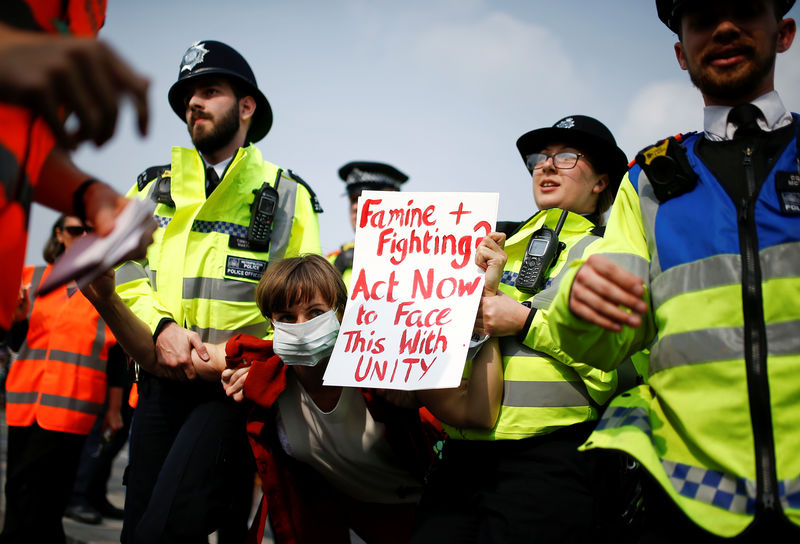By Hannah McKay and Costas Pitas
LONDON (Reuters) - Two environmental activists climbed onto the roof of a train in London's Canary Wharf financial district on Wednesday as part of a third day of action to force Britain to take more radical measures to avert climate change.
The Extinction Rebellion group has ratcheted up its protests in recent weeks, blocking Marble Arch, Oxford Circus and Waterloo Bridge, smashing a door at the Shell (LON:RDSa) building and shocking lawmakers with a semi-nude protest in parliament.
Nearly 300 people have been arrested so far this week after campaigners blocked some of the capital's most iconic locations, many camping in tents on the streets.
The group advocates non-violent civil disobedience to force governments to reduce carbon emissions and avert what it says is a global climate crisis that will bring starvation, floods, wildfires and social collapse.
A man dressed in a dark suit and a woman wearing a black jacket stood on the roof of a train at the Docklands Light Railway (DLR) station in Canary Wharf, holding a banner which read: "Climate Emergency. Act Now."
Some passengers shouted at the pair to get off whilst police headed for the scene. Another activist glued himself to one of the trains.
Transport for London said there were minor delays on a branch of DLR services "due to a customer incident" at Canary Wharf. British Transport Police said they had arrested one man on suspicion of obstructing the railway.
Extinction Rebellion said such direct action was important to bring about change.
"As with a labour strike, economic disruption is key in forcing the government to come to the table and negotiate our demands," they said on their website.
London Mayor Sadiq Khan had urged protesters to avoid targeting the city's public transit system.
"It is absolutely crucial to get more people using public transport, as well as walking and cycling, if we are to tackle this climate emergency," Khan said.
COST TO BUSINESS
The protests have cost over 12 million pounds to businesses in London's West End, famous for its theatres and shops, with some seeing a 25 percent drop in sales and footfall.
"This additional pressure is deeply damaging to London’s economy and reputation," said Jace Tyrrell, chief executive of the New West End Company, which represents businesses in the area.
Police said they expected the demonstrations to continue in the next few weeks and promised to take action if necessary.
"We need to ensure we are striking the right balance between allowing the right to a peaceful protest, while ensuring disruption to communities is kept to a minimum," Chief Superintendent Colin Wingrove said on Tuesday.
The group is demanding the government declare a climate and ecological emergency, reduce greenhouse gas emissions to net zero by 2025 and create a citizen's assembly of members of the public to lead on decisions to address climate change.

In 2017, total United Kingdom greenhouse gas emissions were 43 percent lower than in 1990 and 2.6 percent lower than 2016, according to government statistics.